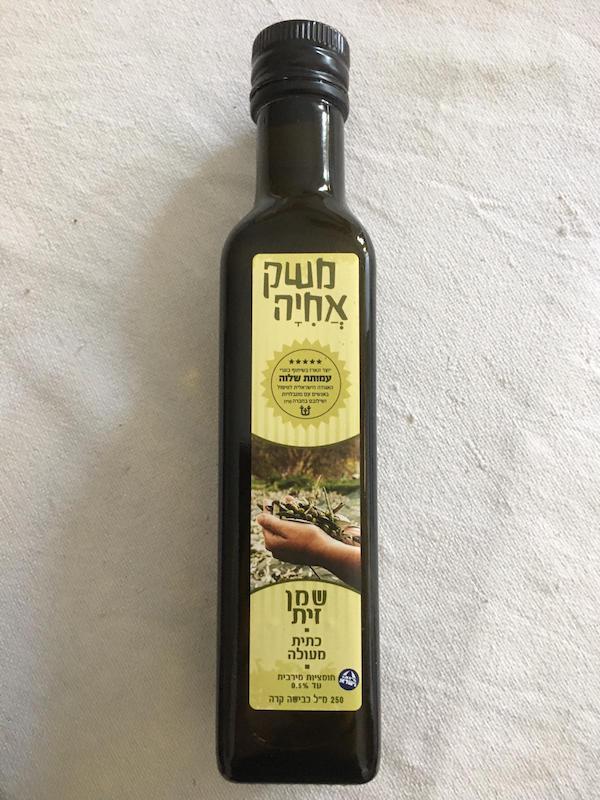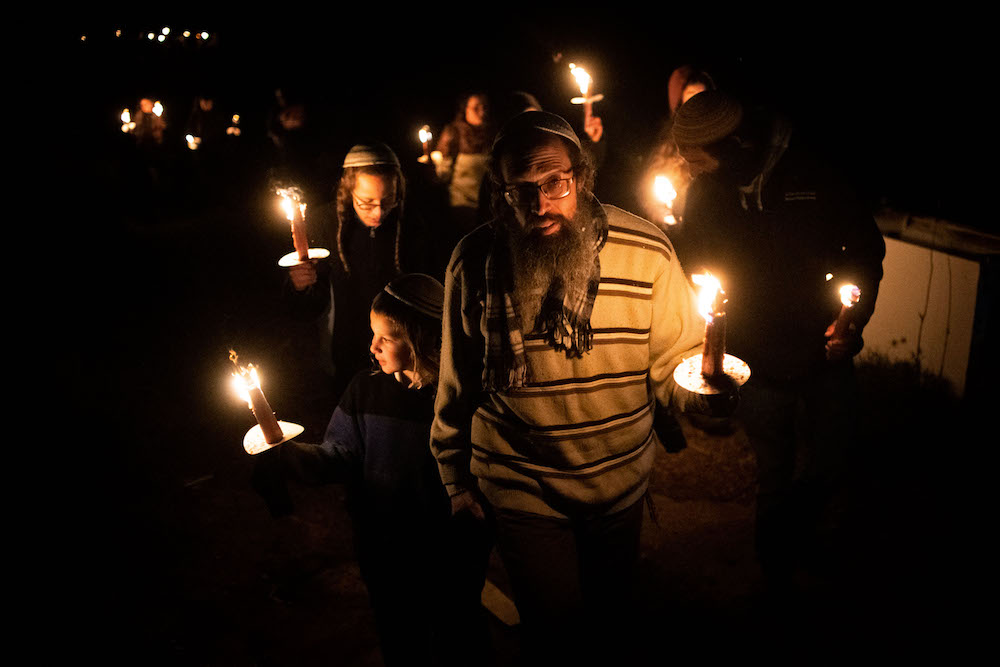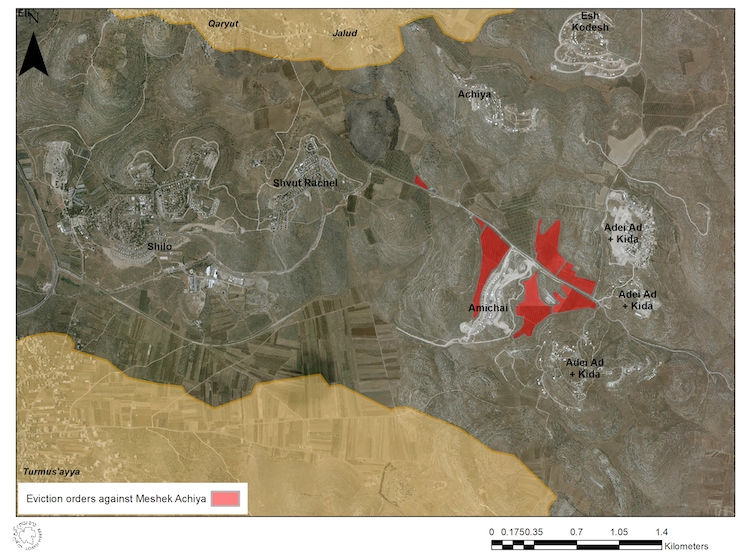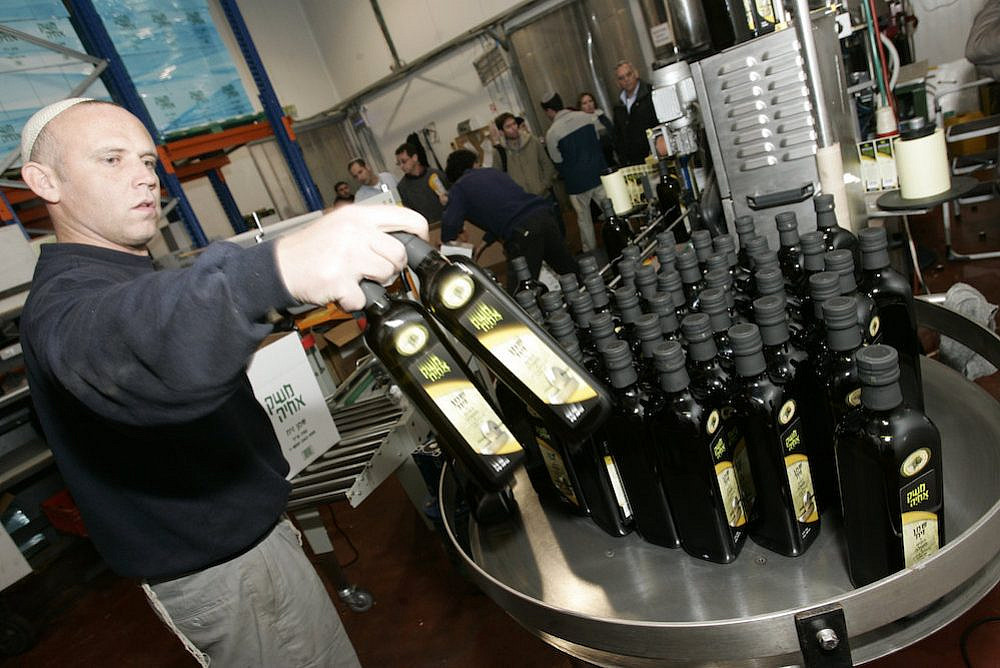Every year in the run-up to Israel’s Memorial Day, the Defense Ministry offers gifts to bereaved Israeli family members, who have lost loved ones due to wars or terror attacks, as a token of their sacrifice to the nation. This year, the Ministry decided it would give the families bottles of olive oil produced in a settlement in the West Bank.
The olive oil, which comes with two packets of tea leaves, features the label “Made in Israel”; but in fact, it is produced by Meshek Achiya, a factory located in the heart of the occupied territories about 45 kilometers north of Jerusalem. Meshek Achiya’s factory was first established in 1997 in the settlement outpost of Achiya on a hilltop east of the Shiloh settlement. This is an area that includes thousands of acres of land belonging to Palestinians in nearby villages. Over the years, the factory moved from the outpost to Shiloh.
According to its website, Meshek Achiya prides itself on hiring Jews only, claiming that it adheres to “Hebrew agriculture based on true Zionism and the ideal of building the land.” It was recently discovered that despite this pledge, Meshek Achiya also employs Thai workers.
The Shiloh area is a hotbed of settler violence against Palestinians. According to Dror Etkes of Kerem Navot, an Israeli NGO that monitors settlement activity in the occupied territories, Achiya is one of six outposts that was built east of Shiloh in order to seize land owned by the residents of the nearby Palestinian villages of Jalud, Karyut, Turmusaya, and Al-Mughayer. The goal, Etkes says, is to prevent territorial contiguity between the villages and thus the establishment of any Palestinian autonomy.

Jalud, for example, has seen its population drop by hundreds due to violence by the six surrounding settlement outposts, including Achiya, which have taken nearly a fifth of the village’s agricultural land. Many of Jalud’s residents have left to different cities in the West Bank, and in some cases to the United States.
Between 1998 to July 2012, Israeli human rights NGO Yesh Din documented 96 incidents of violence by settlers from the nearby outpost of Adei Ad against Palestinians and their property. The Israeli authorities, however, have failed to enforce the law and prosecute the criminals (45 of the 49 criminal complaints filed by Palestinians during that period were closed).
There are over 130 outposts in the occupied West Bank, all of which were established illegally under both Israeli and international law (under the latter, all settlements in the occupied territories are considered illegal).
In February 2017, the Knesset passed the “Regularization Law” to retroactively legalize settlements and outposts that are built on land that Israel recognizes as privately-owned by Palestinians. Following its passage, a group of Palestinian local authorities and three human rights organizations petitioned Israel’s High Court to cancel the law. The law’s implementation has been frozen as part of an agreement between the government and the petitioners until the High Court rules on its constitutionality.
According to Etkes, Meshek Achiya was founded in 2003 by three former residents of the nearby settlement of Eli. Following the outbreak of the Second Intifada, the settlers, with the help of the army, set up a roadblock on an old agricultural road connecting the nearby Palestinian villages to their land. The blocking of this road, coupled with violence against Palestinians who tried to enter, made it easy for the settlers to take over the land, says Etkes.

The Palestinian landowners, represented by the Israeli NGO Hakel (in its previous incarnation as Rabbis for Human Rights) filed a complaint to the Civil Administration, the arm of Israel’s military government that rules over the West Bank. The Civil Administration then issued six different eviction orders against Meshek Achiya between 2008 and 2012, including a demand to vacate privately-owned Palestinian land that the company had seized illegally.
Etkes says Meshek Achiya’s land grab is part of a larger process of land takeover in the West Bank using agriculture as a major tool. According to Kerem Navot’s research, over 25,000 acres of Israeli agricultural activity takes place in between the military posts, civilian outposts, settlements, and bypass roads in Area C of the West Bank. This area is much larger than the actual built-up area of the settlements and outposts (which constitute about 15,000 acres, not including the Israeli neighborhoods in East Jerusalem). Moreover, the most rapid growth in agricultural areas is occurring around religious and extremist settlements that are located in the heart of the West Bank, such as Shiloh.
This activity, Etkes says, is part of a widespread and well-funded strategy, whose explicit goal is to expand the territory controlled by Israeli settlers throughout Area C.

Gifts offered by the Defense Ministry in recent years have included a glass hologram, a menorah marking 70 years since Israel’s founding, and a book on Israeli innovation. It is unclear whether any of them were produced in West Bank settlements.
Gili Meisler, the media and communication manager for the Parents Circle — Families Forum, a joint Israeli-Palestinian organization of over 600 families whom have lost an immediate family member to the ongoing conflict, says that for decades the government has been sending bereaved families yearly gifts on Memorial Day, but called the decision to send olive oil from a settlement “pathetic and angering.”
“There is no gift the state can give you to lessen the pain,” says Meisler, whose brother went missing during the 1973 Yom Kippur War and whose body was identified two years later, “but the moment it decides to give a gift, there needs to be a lot of thinking behind it and they need to make sure it won’t be controversial. A product from the settlements will obviously anger a lot of people. It’s grotesque.”
+972 reached out to the Defense Ministry for comment. It will be published here as soon as it is received.
Correction: A previous version of this article stated that the the gift came with tea leaves that were also produced in Shiloh. They are, in fact, produced inside Israel.


